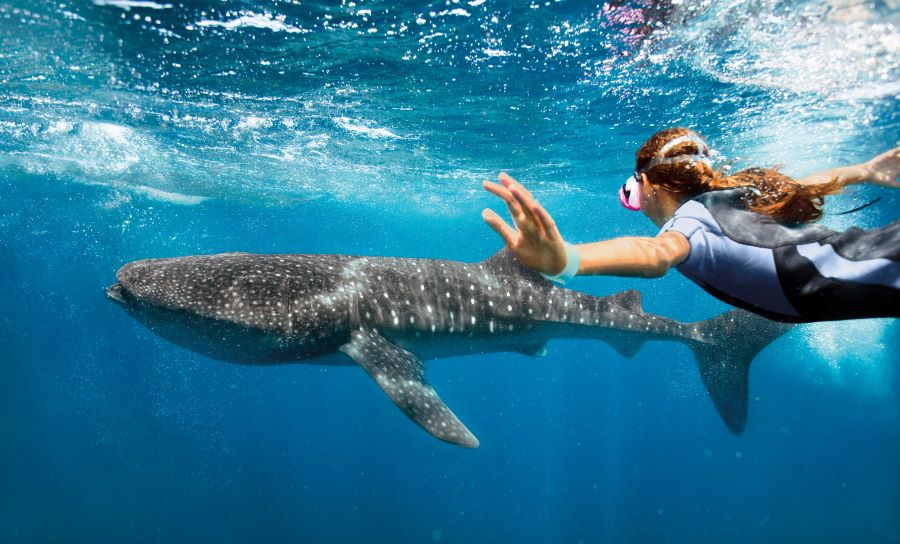They told me not to chase it.
Just float. Wait. Breathe slowly. Let the ocean do the rest.
But when you’re in open water, goggles fogging up, your heartbeat in your ears, and the surface above starts to blur, it’s hard to be patient.
I took one last breath and duck-dived under. Arms close to my body. Legs slow. I didn’t want to splash. I just wanted to see.
I counted.
Five seconds.
Ten.
Fifteen.
Nothing.
Twenty seconds. Still nothing.
I almost gave up. And then—just like that—there it was.
A Shadow in the Blue
I couldn’t see its whole body at first. Just a shape. Wide, calm, slow. It didn’t charge or flash past me like a dolphin might. No sudden entrance. It simply drifted into view like a moving island, barely acknowledging I was even there.
It was the biggest thing I had ever seen in the ocean.
A whale shark.
I’d waited years for this. Dreamt about it while stuck in meetings, imagined it during long flights, watched dozens of videos of people having their “moment.” And now, there I was, frozen in the water, my lungs burning, my eyes wide.
The Sumbawa Way
I was in Saleh Bay, a lesser-known marine spot off the coast of Sumbawa, Indonesia. And one thing was clear right away: this wasn’t one of those chaotic, tourist-heavy snorkel spots.
No big groups.
No one pushing to get the perfect selfie.
No one touching the animal (thank God).
It felt… ethical. Intentional.
That was important to me. I’d read stories about places where whale shark interactions were more of a zoo than a real experience. I wanted something honest. Something that respected the animal more than the humans watching it.
That’s how I found this Sumbawa whale shark ethical adventure—where it’s not just about seeing the animal, but understanding how to be with it.
Floating in Silence
When you’re underwater, time stretches. A few seconds feels like a minute. And swimming with whale sharks adds another layer—you’re moving, but you’re trying not to disturb. It’s a weird balance: stay close, but not too close. Match the rhythm, but don’t intrude.
I floated, and it floated.
It turned slightly, enough for me to see the constellation of white spots across its back—each one like a fingerprint, unique and glimmering. Its eyes barely glanced my way. It didn’t mind me. That’s what made it feel so pure.
There’s a kind of connection that happens in moments like that. You don’t speak. You don’t wave. You just exist side by side, sharing space, even if only for a short while.
Above the Surface
Back on the boat, we all sat quietly. No one said much. It wasn’t that we didn’t have words. We just didn’t need them.
Someone handed me a slice of pineapple. Another pointed to the shoreline where a group of goats stood awkwardly on a steep hill. We laughed. We relaxed.
The day had just started, but already felt full.
The boat captain told us stories about his grandfather, who used to fish in this bay and once mistook a whale shark for a sea ghost. We listened. We learned. It was more than a wildlife tour—it felt like visiting a sacred place with people who knew how to honor it.
The Ethical Difference
What makes this kind of whale shark experience so powerful isn’t just the whale shark itself—it’s the entire atmosphere. The approach. The values behind it.
When I looked into this trip, I wasn’t just looking for “the best place to see whale sharks.” I wanted to know it would be done right. That it was built on respect.
Saleh Bay offers something few places do—a real connection. One where the people running it care about the future of the animal, the ocean, and the community that depends on both.
They don’t overpromise. They don’t corner the sharks. They wait, watch, and adapt. The entire trip felt balanced, thoughtful, and incredibly human.
Whale Shark Watching That Feels Right
We saw more whale sharks that day. Each appearance was different. One came close to the boat and lingered near the surface. Another swam deeper, its shape barely visible through the cobalt water. But every encounter carried the same quiet weight.
It wasn’t just about ticking off a bucket list.
It was about being in the moment.
Letting the sea show you what it wanted to show.
I’m not a marine biologist. I’m not even a strong swimmer. But out there, floating in a bay surrounded by mountains, I felt part of something ancient.
Something untamed, yet welcoming.
Moments That Stay
That night, I couldn’t sleep.
Not because I was uncomfortable—but because my head was full. I replayed everything—the light, the movement, the way the water felt when I dove in.
And the moment I held my breath, waited, and finally saw it.
That feeling has stuck with me longer than I thought it would. Not the adrenaline, but the stillness. The sense that there are places left in the world where nature leads the way, and humans learn to follow gently.
